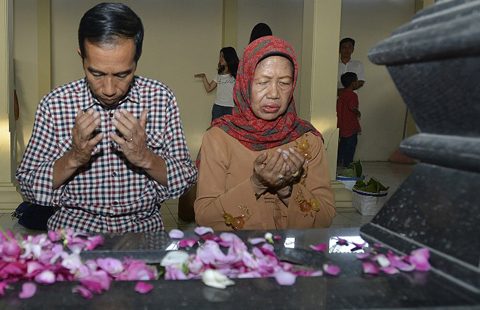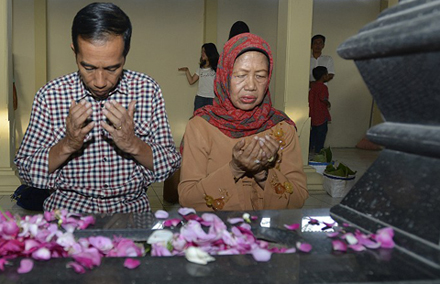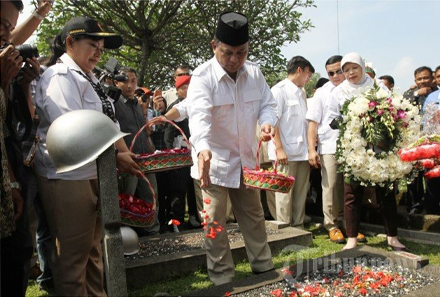If the living won’t vote for Joko Widodo, will the dead intervene, asks Vannessa Hearman.
In this year’s Indonesian presidential race, the tradition of ziarah, a kind of pilgrimage to gravesites, has been used as a tool of political communication and campaigning.
Through it, candidates project an image of themselves in association with the graves that they visit.
Ziarah involves paying respects to the dead and at times praying for outcomes that benefit the visitor. Of late, ziarah has been used to halt the slide in support for Jokowi among Nahdlatul Ulama and the National Awakening Party (PKB) circles.
The graves of religious and political leaders are of particular significance in the ziarah tradition. Indonesia’s first president Sukarno has been transformed into a demi-god as can be witnessed at his grave in Blitar where groups of visitors take turns to approach the grave. Peddlers trade in fragrant rose petals that visitors purchase to pray over and then to scatter over the grave. On 12 March, Joko Widodo visited Sukarno’s grave together with Megawati Sukarnoputri. It raised speculation that he was running for president and was there to pray for a successful campaign.
As well as Sukarno, during May Jokowi also paid a visit to the grave of Indonesian Muslim leader, the late Abdurrahman Wahid at the Tebuireng Pesantren in Jombang, East Java. The Tebuireng Pesantren hosts the graves of NU founder Kiai Haji Hasyim Asyari and leaders such as Yusuf Hasyim. The visit could be regarded on both spiritual and political levels.
Wahid was the leader of the National Awakening Party, one of Jokowi’s coalition partners. Wahid is however not just any Muslim leader, but a reformer with progressive values. It was Wahid who floated the idea of abolishing the parliamentary decree of 1966 banning communism. Wahid was known as a supporter of pluralism in Indonesia. At Jokowi’s visit to Wahid’s grave he was mobbed by interested onlookers. The visit was about proclaiming a certain brand of Islam represented by NU and the PKB which in the eyes of NU supporters is about tolerance and peace.
While Prabowo has also visited Sukarno’s grave last year in December, he has emphasised his political credentials by visiting the graves of military figures. In early June, his visit to former president Suharto’s grave with his former wife and Suharto’s daughter Titik was timed to coincide with Suharto’s birthday on 8 June. On 17 June he visited the grave of M Yusuf in Makassar, former Armed Forces Commander and Defence Minister (1978-83).
Both Prabowo and Jokowi have paid respects at their fathers’ gravesites, thus showing their sense of filial duty. On 14 June with his mother, Jokowi visited his father Widjiatno Notomihardjo’s grave in Karanganyar in Solo during a campaign visit to the city. The visit to his father’s grave was interpreted by some journalists as having the purpose of seeking his father’s doa restu, or blessing for the upcoming presidential debate. However Jokowi rejected this and said his visit was simply to say a prayer for his father. Prabowo visited his father Sumitro Djojohadikusumo’s grave in May in Karet Bivak, Jakarta.
Grave visits are commonly paid to those of the Wali Songo, the nine Islamic saints whose graves are scattered around Java. In June, the PKB sent a team on the Wali Songo pilgrimage and culminating with a visit to Tebuireng pesantren where Nahdlatul Ulama leaders are buried. According to M Hanif Dhakiri, chairperson of PKB Central Leadership Board, their aim was to consolidate support for Jokowi and Jusuf Kalla among the village kiai (Islamic religious leaders) and the devout Muslim santri community, important NU constituents.
He said the pilgrimage combined the ‘worldly purpose’ of the PKB, of consolidating support for the pair, as well as spiritual.
Several days later on 16 June, deputy secretary general of PKB Fatchan Subchi told Tribunnews that after praying at Sunan Kalijaga’s grave, the delegation saw ‘an image of a rightful leader’. A positive energy emanated, he claimed, which then reflected the figures of Jokowi and Kalla as ‘ideal candidates for leaders’.
Visions aside, the PKB has been riven with divisions in these elections. The PKB has relied on NU to provide its backbone of support. However the NU mass organisations have taken different positions with regards to the elections. A section of NU, the paramilitary organisation Banser in East Java has broken with PKB and its own leadership organisation, Ansor and has thrown its weight behind Prabowo. Ansor supports Jokowi.
In East Java, Muslimat NU, the women’s wing of NU supports Prabowo, in defiance of its national chairperson, Khofifah Indar Parawansa who supports Jokowi. Khofifah Indar Parawansa was Minister for Women’s Empowerment under Gus Dur. A number of East Javanese kiai support Prabowo. The Wali Songo ziarah was important for PKB to reign in the NU mass organisations whose grassroots reach is important to harness, but it is questionable if this mission was successful.
However, it must be said that it is important to visit ‘the right dead’.
A picture was circulated on Twitter of Jokowi standing beside the grave of Boris Yeltsin, indicating Jokowi has communist sympathies. One of those who circulated the picture was Ronin RI, an anti-communist Twitter account. The picture was circulated with the question, “Have you finished studying communism in Russia and China, Jok?”
Jokowi was, they allege, ‘groomed’ by China and Russia in communism in 2006. Ronin RI’s knowledge of Soviet history must not be that good however because while Yeltsin might have had a career as a Soviet communist leader, he was also responsible for officially dismantling the Soviet Union in 1991. Since then, Jokowi supporters have set out to prove the photo was a hoax. Therefore the choice of whose grave one visits matters a great deal.
The practice of ziarah displays one’s political as well as spiritual colours and these elections are no exception. It is a way to relate to voters and to mark out one’s values.
The dead, as it turns out, have been drafted into worldly matters of the living.
Vannessa Hearman is a lecturer in Indonesian studies at the University of Sydney.
 Facebook
Facebook  Twitter
Twitter  Soundcloud
Soundcloud  Youtube
Youtube  Rss
Rss 

